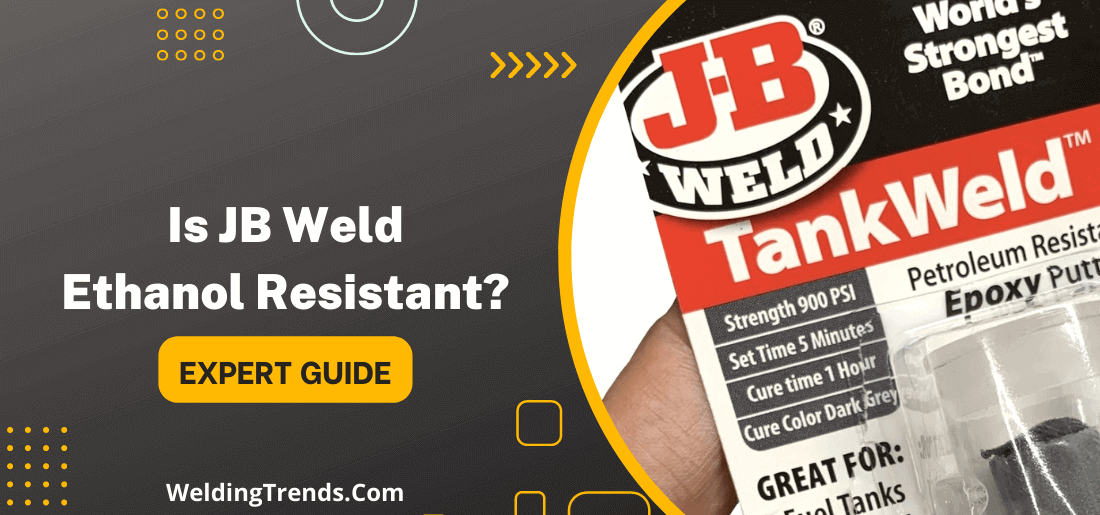You may have heard that JB weld is ethanol resistant and you may be wondering if that’s true. JB weld is a great go-to for fixing things but does it work with ethanol? Can you use JB weld on an ethanol fuel tank or intake manifold?
In this post, we’ll take a look at whether the JB weld is ethanol resistant and how to use it if you need to fix something that’s been exposed to ethanol.
JB weld is well known for its strength and versatility but what happens when it’s exposed to fuel Alcohols like ethanol?
Is JB weld ethanol resistant?
The answer is yes and no. JB weld can withstand exposure to fuel but it will eventually break down and needs to be replaced.
JB weld is not a permanent fix but it will hold up for a while. If you need a more permanent solution, you can try using epoxy or another type of adhesive.
It is made of two parts, an epoxy resin and a hardener that when mixed create a very strong bond. However, this bond is not impervious to the effects of ethanol.
Over time, exposure to ethanol will cause the bond to weaken and eventually fail. This is why it is not recommended for use in applications where ethanol will be present.
Related Article: Is JB Weld Gas Resistant?
Pros and cons of using JB weld for ethanol resistance
There are a few pros and cons to using JB weld for ethanol resistance.
Pros:
- JB weld is specifically designed to adhere to metal and create a waterproof seal. This makes it ideal for use in areas where ethanol resistance is required, such as fuel tanks or lines.
- JB weld can resist high temperatures, making it ideal for use in areas where hot liquids will be present.
Cons:
- JB weld is not as flexible as some other materials, so it may crack if used in areas where vibration is an issue.
- It is also important to note that JB weld is not 100% ethanol resistant. While it will resist most ethanol blends, it is not recommended for use with 100% pure ethanol.
- Another con is that JB weld takes longer to cure than some other options, so you will need to plan and allow plenty of time for it to set before using the area where it is applied.
- JB weld takes 24 hours to fully cure, so it is not ideal for use in emergencies.
Overall, the JB weld is a good option for ethanol resistance, but there are a few things to keep in mind before using it. Make sure to take into account the flexibility of the metal you are working with, as well as the cure time of the JB weld, to ensure a successful application.
How does ethanol interact with JB weld and other adhesives/sealants?
Ethanol is known to interact with some adhesives and sealants including JB weld. This interaction can cause the adhesive or sealant to break down, which can lead to leaks or other problems.
It is important to check with the manufacturer of the adhesive or sealant before using it with ethanol. Some adhesives and sealants are designed to be used with ethanol, while others are not.
For example:
- According to the J-B Weld website, their products are not designed for use with ethanol.
- According to the Loctite website, their adhesives and sealants are compatible with ethanol.
It is always best to check with the manufacturer of the product to determine if it is compatible with ethanol.
What are potential implications of using JB weld in ethanol-based fuel system?
JB weld is not recommended for use in ethanol-based fuel systems due to the potential for corrosion and degradation of the JB weld.
In addition, JB weld can potentially clog fuel filters and fuel injectors, leading to engine performance issues.
Finally, the JB weld is not compatible with rubber or plastic materials commonly used in fuel system components, which could lead to leaks. As a result, it is generally advisable to avoid using JB weld in ethanol-based fuel systems.
How to test ethanol resistance of JB weld?
To test the ethanol resistance of the JB weld, you will need to perform a simple test.
- First, take a small amount of the weld and mix it with an equal amount of ethanol.
- Next, apply the mixture to a piece of metal and allow it to dry.
- Finally, use a hammer or other blunt object to strike the metal near the weld. If the weld cracks or breaks, then it is not resistant to ethanol.
Also, if you have a piece of JB weld that has already been cured, you can perform this test by applying the ethanol mixture to the cured weld. Once the weld is dry, try to scrape it off with a sharp object.
If the weld does not come off easily, then it is resistant to ethanol.
How can you tell if an adhesive or sealant is ethanol resistant or not?
If you are working with adhesives or sealants, it is important to know if the product is ethanol-resistant. Ethanol is a common solvent and can break down many materials, including some adhesives and sealants.
To find out if a product is ethanol-resistant, simply check the label or ask the manufacturer.
Another way to tell if an adhesive or sealant is ethanol-resistant is to test it yourself. To do this, simply apply the product to a small area and then expose it to ethanol. If the product does not dissolve or break down, then it is likely to be resistant to ethanol.
If you are unsure about a product’s ethanol resistance, it is always best to test it before using it in your project. This will ensure that you are using the right product for the job and avoid any potential problems.
alternative adhesives or sealants that would be more ethanol-resistant than JB weld?
JB weld is a two-part epoxy adhesive that can be used to bond together a variety of different materials. It is resistant to many chemicals, including ethanol.
However, there are some alternative adhesives and sealants that may be more resistant to ethanol. Some of these include:
1. Polyurethane adhesives
Polyurethane adhesives are one type of alternative adhesive that may be more resistant to ethanol. These adhesives are typically used in applications where a strong bond is required, such as in construction or automotive applications.
2. Silicone adhesives
Silicone adhesives are another type of alternative adhesive that may be more resistant to ethanol. These adhesives are typically used in applications where a flexible bond is required, such as in sealing applications.
3. Acrylic adhesives
Acrylic adhesives are another type of alternative adhesive that may be more resistant to ethanol. These adhesives are typically used in applications where a clear bond is required, such as in bonding glass or plastic materials.
It is important to note that no one adhesive or sealant is completely resistant to all chemicals, including ethanol. However, the alternatives listed above may provide better resistance to ethanol than JB weld.
When selecting an adhesive or sealant for an application, it is always best to consult with a professional to ensure that the product selected is best suited for the intended application.
FAQs – Is JB weld ethanol resistant?
Can J-B Weld be used on a gas tank?
Yes, J-B Weld can be used on a gas tank. J-B Weld is very strong and durable, so it should be able to hold up against the chemicals in gasoline.
If you are going to use J-B Weld on a gas tank, make sure that you follow the instructions carefully and allow the epoxy to cure for the full amount of time before using the tank.
Is epoxy resistant to ethanol?
Yes, epoxy is resistant to ethanol. However, it is important to note that there are different types of epoxy, so some may be more resistant than others.
When choosing epoxy for a project that will come into contact with ethanol, it is always best to consult with the manufacturer to ensure that the specific type of epoxy being used is appropriate for the application.
Can J-B Weld be used on exhaust?
Yes, J-B Weld can be used on exhaust systems. It can be used to repair holes, cracks or leaks in the exhaust system. JB Weld is a high-strength epoxy that dries to a hard finish.
It can withstand high temperatures and has a strong bond that will not break down under heat or vibration. JB Weld can be used on any metal exhaust system, including stainless steel and cast iron. It can also be used on aluminum, brass and copper.
Is J-B Weld fireproof?
No, J-B Weld is not fireproof. However, it can resist temperatures up to 1200 degrees Fahrenheit. So, if you’re looking for a product to protect your home or business from fires, J-B Weld may be a good option.
Wrap Up
JB weld is ethanol resistant and can be used to fix tanks that have been damaged by the fuel. If you’re looking for a quick, easy way to fix your tank, JB weld is a good option. Be sure to follow the instructions closely to get the best results.
JB Weld is an excellent choice for repairing tanks that have been damaged by ethanol. It is easy to use, dries quickly and does not corrode or rust over time.
Although JB weld is resistant to ethanol, it is always best to test the product in your specific application for confirmation.
But remember it is not a permanent solution. If you are unsure, always consult a professional to get the best and safest results for your project. Thanks for reading!




